NDItech has recently been doing a lot with FrontlineSMS. Via their blog they share thoughts on experiences using the software: Given its heritage it's not surprising that FrontlineSMS really nails our mantra of "appropriate technology" in a number of ways.
- It doesn't have a steep learning curve. Our partners in Eastern Europe downloaded and got it working on their own before I even got to show it to them.
- It runs on very common technology
- It communicates with people where they are: text messaging. Across Africa, as we've mentioned, mobile phones are far and away the best way to reach people.
In the vast swaths of the world where only elites are on the internet, this is a great way to build connections between organizations and their members, whether civil society groups, political parties, or other groups.
We're using Frontline in Haiti, where Katherine is involved with getting local "Information Centers" connected with their constituents via FrontlineSMS.
But it's also valuable in other situations: where there may be internet access, but it's heavily filtered, censored, monitored or otherwise controlled by the government. SMS texts can be monitored as well, of course, but it can be easier to fly under the radar if your volume is not too high or you're not using sensitive keywords.
The great flexibility of FrontlineSMS makes it easier to recover from blocking, too. If all you need is a normal phone, changing numbers - and making the censors find you again - can be as easy as swapping SIM cards.



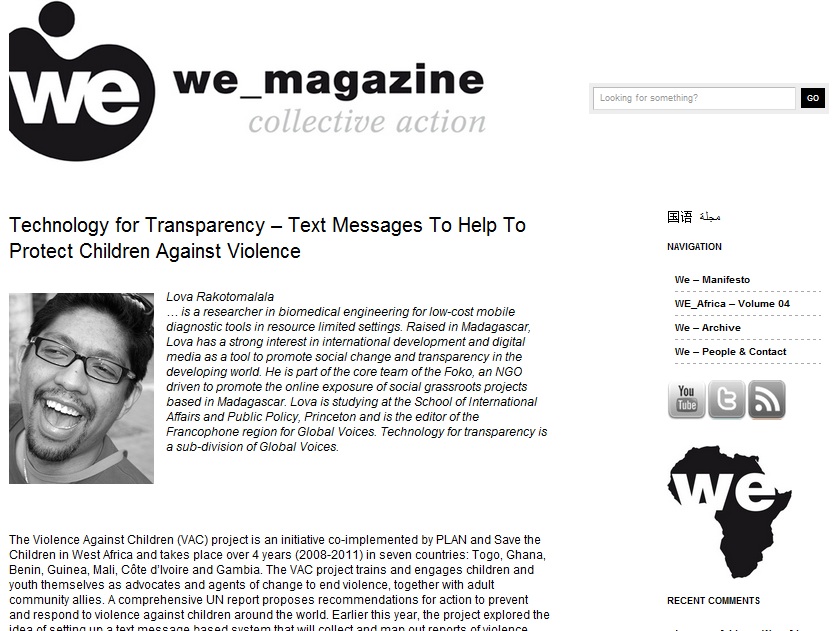
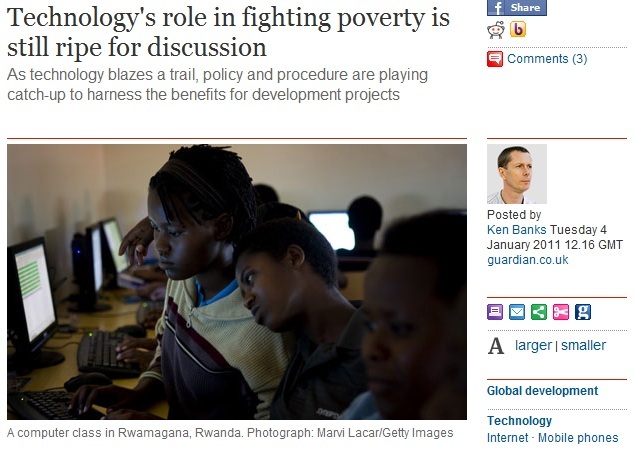
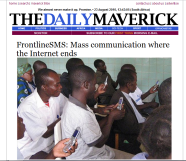
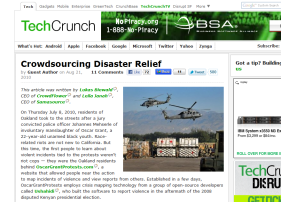 A group of companies, including Ushahidi, FrontlineSMS, CrowdFlower and Samasource, collaborated to set up a text message hotline – “Mission 4636” – supported by the U.S. Department of State. The Haitian government collaborated with radio stations to advertise the hotline, and a few days after the disaster, anyone in Port-au-Prince could send an SMS to a toll-free number, 4636, to request help. The messages were routed to relief crews at the U.S. Coast Guard and the International Red Cross on the ground.
A group of companies, including Ushahidi, FrontlineSMS, CrowdFlower and Samasource, collaborated to set up a text message hotline – “Mission 4636” – supported by the U.S. Department of State. The Haitian government collaborated with radio stations to advertise the hotline, and a few days after the disaster, anyone in Port-au-Prince could send an SMS to a toll-free number, 4636, to request help. The messages were routed to relief crews at the U.S. Coast Guard and the International Red Cross on the ground.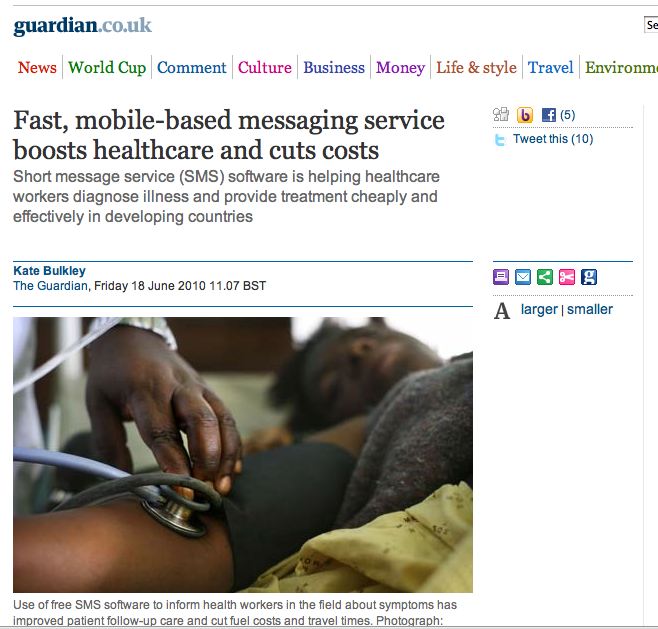 "The community health workers were able to get the information to the right people about symptoms much faster," says Josh Nesbit, executive director of FrontlineSMS:Medic. "Now all patient follow-up is based on SMS messages, which means that less patients are dropping out of their drug programmes because they forget or don't know where to get the drugs."
"The community health workers were able to get the information to the right people about symptoms much faster," says Josh Nesbit, executive director of FrontlineSMS:Medic. "Now all patient follow-up is based on SMS messages, which means that less patients are dropping out of their drug programmes because they forget or don't know where to get the drugs."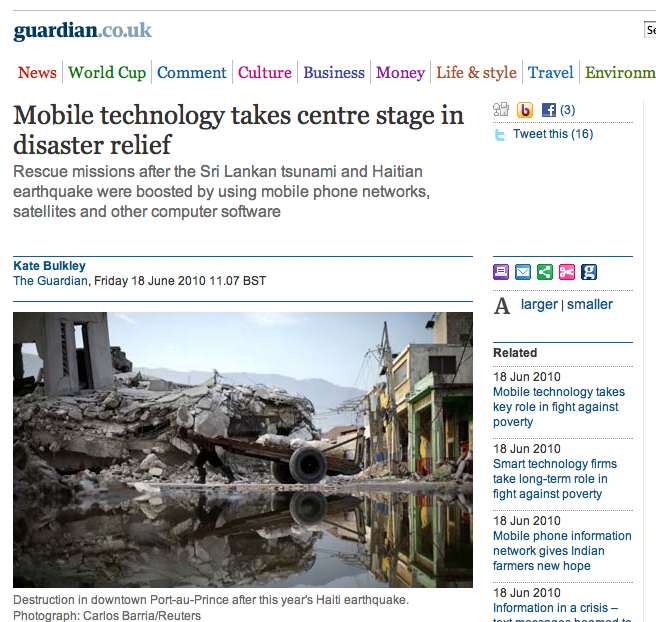 "The good news about mobile penetration is how you can interact with people at scale to serve a social good and be in touch with people's needs," says Josh Nesbit, executive director of
"The good news about mobile penetration is how you can interact with people at scale to serve a social good and be in touch with people's needs," says Josh Nesbit, executive director of 
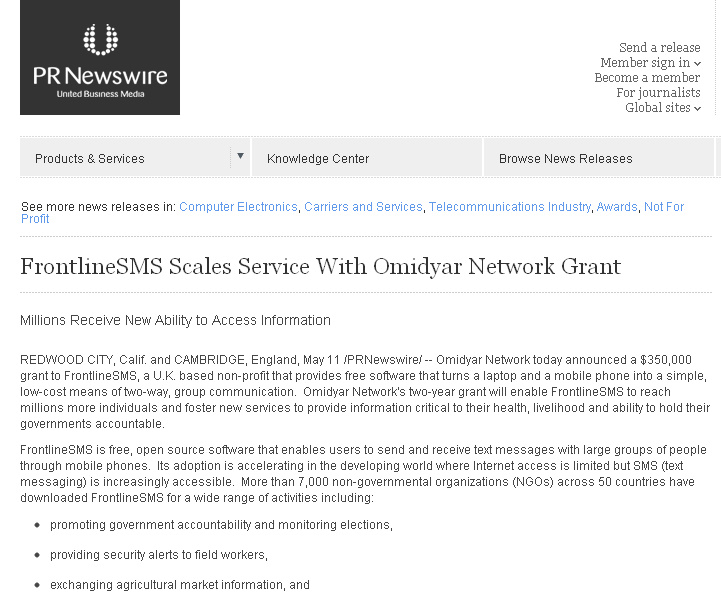
 Mr Conley hopes "hundreds of thousands of people" will use the system, which has been promoted by distributing "thousands of leaflets" and radio reports.... In addition, he said, each text message is relatively expensive, costing the equivalent of two minutes of talk time.
"Even though that is the same amount of money it costs to buy bread for your family people have told me that some will be willing not to eat that evening [in order to be able] to tell the international community what is going on in the country."
Mr Conley hopes "hundreds of thousands of people" will use the system, which has been promoted by distributing "thousands of leaflets" and radio reports.... In addition, he said, each text message is relatively expensive, costing the equivalent of two minutes of talk time.
"Even though that is the same amount of money it costs to buy bread for your family people have told me that some will be willing not to eat that evening [in order to be able] to tell the international community what is going on in the country."

 The pilot project, which has been running for five months, has already had a significant impact: as well as getting emergency medical attention for 130 people who would have otherwise gone unseen, it has allowed the hospital's tuberculosis officer to treat twice as many people because his time can now be more used more efficiently.
The pilot project, which has been running for five months, has already had a significant impact: as well as getting emergency medical attention for 130 people who would have otherwise gone unseen, it has allowed the hospital's tuberculosis officer to treat twice as many people because his time can now be more used more efficiently.